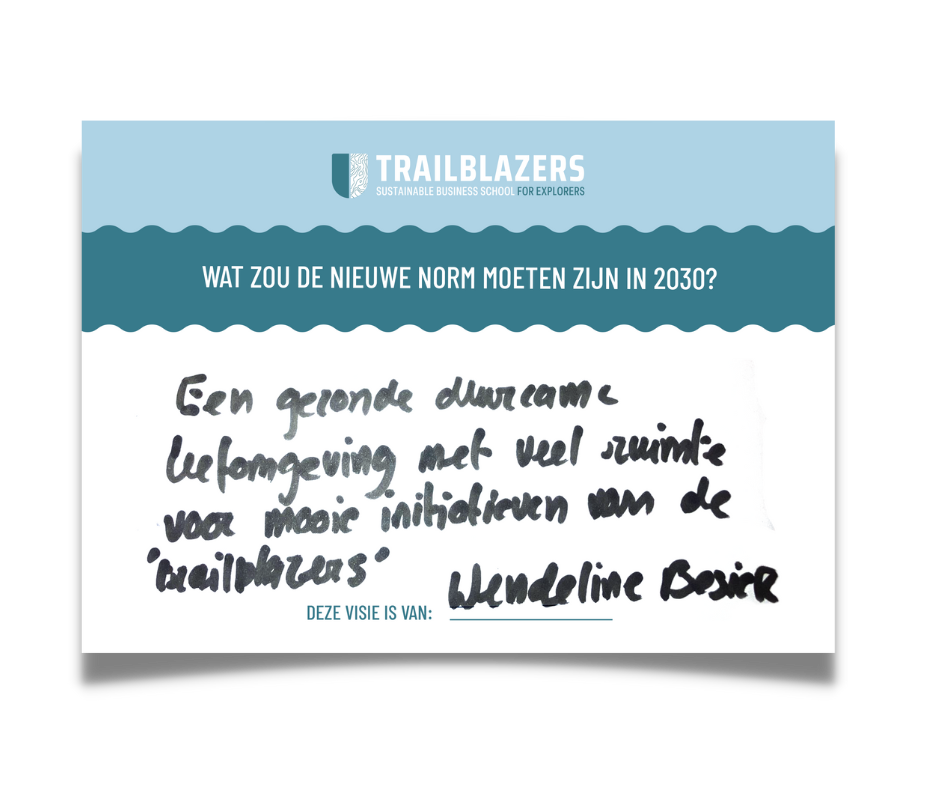SERIES FRONTRUNNERS & FRONTIER EXPLORERS - EPISODE 2
IN CONVERSATION WITH WENDELINE BESIER, SUSTAINABILITY DIRECTOR AT DURA VERMEER
How do experts view entrepreneurship in times of transition? Trailblazers talks to frontrunners and frontier explorers to find out. Today, we speak to Wendeline Besier, programme director Sustainability at Dura Vermeer's Infra division. The family-owned company has the goal of taking its CO22emissions to zero. But how does Wendeline take such a large construction company on board? And what tips does she have for entrepreneurs and professionals with bright sustainability ambitions?
READ THE FULL INTERVIEW
What is your motivation for getting involved in sustainability?
"Yes, it's kind of in you. I am always convinced: you cannot be an impact entrepreneur or be involved in sustainability if you don't have an intrinsic real passion to make the world a bit better. For me, this stems from my childhood. I grew up in Amsterdam and regularly went to visit my grandparents near The Hague. My grandfather was an avid supporter of the World Wildlife Fund and a huge animal lover. We looked at books about animals together and I was taken in by his enthusiasm. We knew all the campaigns, like saving whales, gorillas and orang-utans. My love for nature was born there. I started doing other things during my studies in Utrecht and was totally unconcerned with saving the world. I didn't know where my passion lay in terms of work. Gradually, through internships and traineeships, I became interested in making impact and value, also in my work. That's how I slowly got into the sustainability domain, although at the time it was not a hot topic. Now, fortunately, it is different and anyone can delve into it and study for it. But back then, I more or less rolled into it automatically."
It's interesting that you say it's in you. How do you deal with people for whom sustainability does not come naturally?
"I think it is important to make people aware of their responsibility and the impact they have. Intrinsic motivation plays a big role in this. But I think you can also try to engage people by showing that sustainability is not just about saving the world, but also about creating beautiful projects. At Dura Vermeer, I often say to colleagues who may not be intrinsically motivated: "Let's just make this project more beautiful." After all, everyone wants to create something beautiful, and that can also be done in a sustainable way.
Resistance or misunderstanding, especially in a large organisation, is order of the day. I once did an internship at Max Havelaar. Only people who were passionate about sustainable cocoa and coffee worked there. That's very nice work, because then you don't have that friction. In a large corporation , you have to deal with many different people who also look at the subject of sustainability in very different ways. And yes, there are those people and sometimes you start a discussion. But I prefer to focus on the people who are willing. I try to give them the energy and incentive to do more with sustainability. Sometimes it is a disappointment, especially when people hold key positions in our organisation. Then it is also a matter of moving with them. And trying to include them in your goal of creating a more sustainable company."
"I THINK BEHAVIOURAL AND CULTURAL CHANGE IS VERY IMPORTANT TO EVENTUALLY MAKE THAT TRANSITION. AND THAT REQUIRES SOMETHING FROM ALL OF US. INCLUDING PEOPLE WHO MAY NOT BE INTRINSICALLY MOTIVATED." - WENDELINE BESIER
What does your position as programme director for sustainability entail?
"I am responsible for sustainability at Dura Vermeer, in the Infra division. Dura Vermeer is one of the largest construction, engineering and infrastructure groups in the Netherlands. We are a family business under the inspiring leadership of Job Dura. And we do everything in the built environment. So from building houses, to constructing motorways and viaducts, to installing installations in homes and office buildings. I am responsible for how sustainably that is done and I focus on our infra activity, so everything to do with infrastructure. So that motorway, that railway, that viaduct: how can we make it as sustainable as possible? It's a strategic role, so I'm head of a staff department and I have to make sure we're going to deliver on that strategy we have together on sustainability."
What is your view on the role of entrepreneurs and companies in sustainability?
"I think that role is very big. Many of the negative impacts we are currently seeing, such as climate change, are largely caused by industry and business itself. I think companies should take responsibility to prevent or at least quickly reduce these negative impacts.
I do see sustainability as a broader playing field, so I don't think that you can put business alone at the forefront to bring about that change. It requires an interplay of different factors and actors, and it's a transition we have to make together. If you look purely at our construction company, we rely heavily on other actors, such as the government, with regard to highways and flyovers, for example. So yes, companies definitely have a role and have to take responsibility. I often say internally that if there is one sector in the Netherlands that can show that we can act more sustainably, it is the construction and engineering sector. We have all the solutions and are very pragmatic. We like to solve problems, create things and change things. So I really believe that we can integrate sustainability into the projects we realise. I often share this, even with those who may not be intrinsically motivated, by emphasising that together we can realise wonderful projects that are also sustainable."
"MAYBE YOU DON'T EVEN KNOW THAT, FOR EXAMPLE, YOUR SUPPLIER WOULD ALSO LIKE TO JOIN YOU." - WENDELINE BESIER
What skills does a professional need in times of transition?
"One is recognising your responsibility and having an understanding of your impact. So saying: 'yes, I take this responsibility and I am aware of the footprint I leave on this world.' And right before that, of course, is: 'I want to do something with that too.' So the piece of intrinsic motivation is also important. I think it is important to be aware, even as a company and organisation, that you are part of a system and that there are all kinds of links before and after you. How good are you at connecting with those links? And are you able to connect on that sustainability and ambition? You might not even know that, for example, your supplier is also keen to engage with you."
What are you doing to seek that collaboration?
"You can't do it alone, so we really need each other to accelerate that change. One initiative was the Materials Expedition, which we did twice. That's an initiative we started with some other big construction companies, including BAM and VolkerWessels. We talk a lot about sustainability, that we should be circular, that we should reuse materials and that a materials passport should be created, but does it actually happen? We write it down, but do we actually do it? That's what we wanted to investigate. We said to each other: 'as contractors, let's do the practical test and bring that back to the policymakers and decision-makers of our projects.' Nice that we all want circularity, but are we doing it in our projects?' We did a kind of expedition and collected experiences for a year, so we can indicate what we need as market players to make that transition."
How do you get others on your team or in the company to join you in achieving sustainability goals?
"By giving them a role in the process. I think behavioural and cultural change is very important to eventually make that transition. And that requires something from all of us. So you have to properly involve everyone in the process you are going into. The CO22reduction target of halving it by 2030 and going to zero by 2050, is a mega transition we are facing. I don't have all the answers, so I also really need colleagues in organisations who can tell me what works and what doesn't. And that could be the concrete technologist, but also the person who is turning the asphalt every day. So involving people and bringing people into this is very important. So also giving them a role and pointing out their responsibility. So what can they do to contribute? What I've also noticed, and this will also be addressed next year, is that colleagues feel the need for more tools and handles. Look, I am into sustainability and zero CO22, I can tell you that story. But how do you do that if you are not working on it every day? With the client or the customer? So it is important to 'equip' your colleague, so they can tell the story, but also explain what they themselves can or cannot do about it.
I have learned: ten small steps is also one big step. So again, don't make it too big, because that is a kind of mission impossible. Halving CO22 is feasible, we have checked that, of course. It has to be ambitious, yet realistic. Without losing the enormous urgency to change the world and make it more sustainable. But it is also navigating between ambition and reality. This is certainly important in my business too. Because if I get too far ahead of the troops, it becomes very difficult, because then people can no longer follow you. So be concrete. Find words that everyone can understand."

According to Wendeline, the new standard for 2030 should be:
"A healthy sustainable living environment with plenty of room for great initiatives from the 'Trailblazers”.


